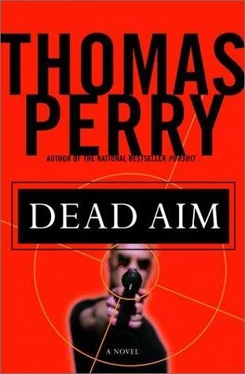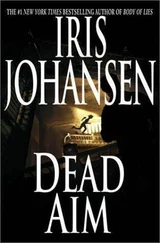Thomas Perry - Dead Aim
Здесь есть возможность читать онлайн «Thomas Perry - Dead Aim» весь текст электронной книги совершенно бесплатно (целиком полную версию без сокращений). В некоторых случаях можно слушать аудио, скачать через торрент в формате fb2 и присутствует краткое содержание. Жанр: Триллер, на английском языке. Описание произведения, (предисловие) а так же отзывы посетителей доступны на портале библиотеки ЛибКат.
- Название:Dead Aim
- Автор:
- Жанр:
- Год:неизвестен
- ISBN:нет данных
- Рейтинг книги:4 / 5. Голосов: 1
-
Избранное:Добавить в избранное
- Отзывы:
-
Ваша оценка:
- 80
- 1
- 2
- 3
- 4
- 5
Dead Aim: краткое содержание, описание и аннотация
Предлагаем к чтению аннотацию, описание, краткое содержание или предисловие (зависит от того, что написал сам автор книги «Dead Aim»). Если вы не нашли необходимую информацию о книге — напишите в комментариях, мы постараемся отыскать её.
Dead Aim — читать онлайн бесплатно полную книгу (весь текст) целиком
Ниже представлен текст книги, разбитый по страницам. Система сохранения места последней прочитанной страницы, позволяет с удобством читать онлайн бесплатно книгу «Dead Aim», без необходимости каждый раз заново искать на чём Вы остановились. Поставьте закладку, и сможете в любой момент перейти на страницу, на которой закончили чтение.
Интервал:
Закладка:
A week later, Mallon had been given an appointment with two women in the private banking office in Palo Alto who were specialists in managing people’s investments. He had explained that he needed to have them invest his money conservatively so he would not be left short before he found a job. The two had looked at the printout that contained his balance, and looked at each other. The older one, who had silver eyeglasses on a silver chain, wrote something on a piece of paper before she spoke. “Mr. Mallon. This is what your investments will throw off in an average year.” She had spun the paper around to face him so he could read the number she had written.
Mallon had thanked the women, signed the various forms they handed him, and then walked out of their building. He’d looked up and down the sidewalk, then up at the sky. As he’d stepped along, the implications of the numbers had begun to demand his attention. The figure the woman had shown him was five or six times what he had spent even when Andrea had lived with him.
He could not stand to live in San Jose anymore, to take circuitous routes just to avoid passing by his family’s farm or his old construction business or Andrea’s new house. He stopped at the office one last time to say good-bye to his former employees, then drove two hundred and eighty miles south to an apartment in Santa Barbara because he had visited the city a few times and had no unpleasant memories of it. After a month he had invested in an old brick colonial house above Mission Street near State. He spent nearly a year remodeling it, doing most of the work himself, and trying to think about his future but failing. He knew nothing about the future, but the past was full of problems he had not solved. During that year, the investments he had left with the private banking people up north had begun their steady growth. At the end of the year, instead of selling the house, he moved into it. There had never again been any practical reason for Robert Mallon to do anything in exchange for money.
In his new life in Santa Barbara he walked everywhere he went, driving only when he needed to carry something bulky or fragile. He acquired a great many acquaintances, because he had plenty of leisure time, spent much of it in public, and spoke to anyone who spoke to him. He made sure he spent two hours a day getting some form of outdoor exercise and two hours reading. But at the end of ten years in the city, Mallon knew that if he disappeared, there would be little notice. He was not a person who was living a life here. He was just very, very slowly passing through.
Diane Fleming’s office was in one of several low Spanish-style buildings on De la Guerra Street painted blinding white with big brass plaques beside their doors. She kept him waiting for five minutes, then rushed into the outer office and shook his hand, and held on to it. “Robert!” she said. “Come on in!” She was in her mid-thirties, and had the distinctive broad-faced blond look that half the women in Santa Barbara had. They had big legs and strong hands like small men, and their appeal was not femininity but a kind of frank robustness. “I’m so sorry to keep you waiting, but I was on a call. Sylvia should have told me sooner.” She kept his hand in hers as she led him into her office and sat beside him on a leather couch, then released it.
“It’s okay. I should have called for an appointment,” he said. “But I need your help with something.”
“What kind of something, and what kind of help?”
“I’ll let you decide. Have you read about the young woman they found dead in a field two days ago?”
She nodded, her face allowing an acknowledgment that was cautious, tentative. “I did see that in the paper.”
“I had pulled her out of the ocean a few hours earlier. I guess she tried again and succeeded. I went to the police and told them. They listened, then asked for a blood sample and fingerprints.”
“They think you killed her?”
“That’s not what the detective said, but I don’t think he would tell me if he did. It’s possible.”
She rolled her blue eyes. “Robert, I’m basically a tax attorney. You’re going to need a criminal lawyer right away. I’ll make some calls and see who we can get. Now go home, and I’ll call you later.”
He had somehow expected a longer conversation, and he had especially expected that she would spend some time reassuring him and telling him there was nothing to worry about before she called in a criminal lawyer. But obviously she agreed that there was something to worry about. He saw no reason to delay her telephone calls. He stood and walked to the door. “Thanks, Diane,” he said, and left. As he was walking through the reception area, he saw Sylvia pick up her phone. She said, “Sure, Diane, right away.”
He went for a long walk down State Street to pick a place to have lunch, but the idea was a failure. He had no appetite, just a restlessness that kept him walking. Mallon barely saw the streets as he walked, because the memory of the girl flooded his mind. He knew that the smooth, beautiful skin he had touched was now cold and lifeless, the voice silenced, but he could still see and hear her, and the knowledge that even that vestige would fade made him want to weep.
He tried to decide whether he had fallen in love with her. He had not been naive enough to allow himself to let go, to place his fate in her hands that way. He had been fairly certain that their day together had been as much of an aberration as what had caused it, a violent diversion from the normal trajectories of their lives. He had, at every moment, been prepared to relinquish her, to send her back to the world, where she would make a life with people her own age. But he had loved her. He had listened to her and watched her and touched her. She was a creature he had been glad he had preserved, somebody he was delighted with and wanted to live on and on, even if he never saw her again. Now that was over, beyond reach. Nobody else seemed to know what a precious thing had been wasted.
When he reached his house, Diane had already called and left a message on his answering machine. When he called her back, she said, “They’re not treating you as a suspect.”
“How do you know?” he asked.
“It’s a long story. They also don’t really know who the girl was. The name she used in the motel didn’t match the name she gave when she rented the car she parked there. She left no other identification in the room, no purse, no keys. There were none in the field where she was found, either. You didn’t happen to see any on her, did you?”
“No,” he said. “And I didn’t see any purse, either. There was nothing but what she had on.”
“Which was-?”
“Shorts, sneakers, a little top with thin straps.” He paused. “I remember seeing her standing there by the rocks. Then she just started walking toward the water and didn’t stop. It was kind of odd. She didn’t dive or swim or anything, just kept walking until the water was over her head and disappeared. I didn’t even notice about the shoes at first.”
“What about them?”
“She left them on,” he said. “I guess she had no reason to preserve her running shoes.”
“I suppose.”
He opened the refrigerator and looked inside. “So I guess I don’t need a criminal lawyer after all. But thanks for taking care of this. I was really beginning to wonder.”
“Oh, no. You do need one, and I got the one I wanted. His name is Brian Logan, and he’s a very big defense attorney, based in L.A. He’s already on your case.”
“If there is no case, what’s he doing?”
“He’s making inquiries, showing the flag. He’s the one who got the police to tell him you’re not a suspect. He’s very expensive, by the way.”
Читать дальшеИнтервал:
Закладка:
Похожие книги на «Dead Aim»
Представляем Вашему вниманию похожие книги на «Dead Aim» списком для выбора. Мы отобрали схожую по названию и смыслу литературу в надежде предоставить читателям больше вариантов отыскать новые, интересные, ещё непрочитанные произведения.
Обсуждение, отзывы о книге «Dead Aim» и просто собственные мнения читателей. Оставьте ваши комментарии, напишите, что Вы думаете о произведении, его смысле или главных героях. Укажите что конкретно понравилось, а что нет, и почему Вы так считаете.












